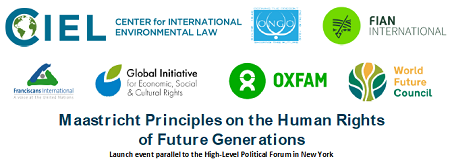Maastricht Principles on the Human Rights of Future Generations
Launch event parallel to the High-Level Political Forum in New York
13 July 2023, 3:30 – 5:00 PM (EDT)
Tillman Chapel — Church Center for the United Nations | United Nations Plaza (44th Street and First Avenue), New York City
Online (with translation in Spanish): us06web.zoom.us/webinar/register/WN_sUGt06LUTtycW8rb4IU6Hw
Already in the 1970s and 1980s, there was a growing understanding that a ”business as usual” model was exposing theEarth, present generations (particularly children and youth) as well future generations. In recent times, these threats havemultiplied. They include the triple environmental crisis of climate change, pollution, and biodiversity loss; the exceedingof “planetary boundaries” through unsustainable patterns of production and consumption; global health threats such asthe Covid-19 pandemic; inadequately controlled and regulated new technologies; the scourge of war and the deploymentof weapons of mass destruction, global conflict and the outbreak of war; and the erosion of long-established norms ofdemocratic governance and civil and political rights in many countries. These and a range of other developments areposing profound threats to the ability of future generations to enjoy all internationally recognized human rights.
Despite the gravity of the human rights threats faced by future generations and a rapidly evolving scholarship on thissubject, there has not been enough attention to the human rights of future generations within the UN and othermultilateral fora. The time was thus ripe to build on three prior Maastricht initiatives that made major contributions to thedevelopment of human rights law: The Limburg Principles on the Implementation of the International Covenant onEconomic, Social and Cultural Rights (1986); the Maastricht Guidelines on Violations of Economic, Social and CulturalRights (1997); and the Maastricht Principles on Extraterritorial Obligations of States in the Area of Economic, Social andCultural Rights (2011). The fourth Maastricht project thus focuses on addressing the major gap in human rightsprotection – the human rights of future generations.
The Maastricht Principles, adopted on February 3, 2023, seek both to consolidate and develop existing human rightsstandards to enhance the protection and fulfillment of the human rights of future generations. They provide a valuableguide to ensure that any action to strengthen solidarity with future generations is in line with international human rightslaw. It is hoped that the Principles will influence national, regional, and international governance processes, decision-making, standard-setting, and jurisprudence, as well as promote social mobilization to advance the human rights offuture generations. Their legal foundations can be found in international instruments, national legislative frameworks,and the Indigenous Peoples’ laws.
Human rights experts will present the motivation, the main debates and processes that led to their adoption, and keythemes in the Principles. They will discuss with States representatives opportunities to better protect these humanrights, including in the context of UN processes, such as the ongoing advisory proceedings at the ICJ concerninghuman rights and intergenerational equity in the context of climate or the preparation of the Summit of the Future to beconvened by the UN Secretary-General in 2024.
PANEL:
Facilitation: Liberato Bautista - CoNGO
H.E Mariza Chan Valverde - Ambassador of Costa Rica to the UN
TBC - mission of the Netherlands
Carrol Muffet - CIEL
Ana María Suárez Franco - FIAN
Christian Courtis - OHCHR
Jan Lönn- NGO Committee on Development (Geneva), ISMUN.
Register: https://docs.google.com/forms/d/1QBjsbwB6neugzcJO4_rJvBXw1tFnGKGoBLfHdsqnKxA/edit














